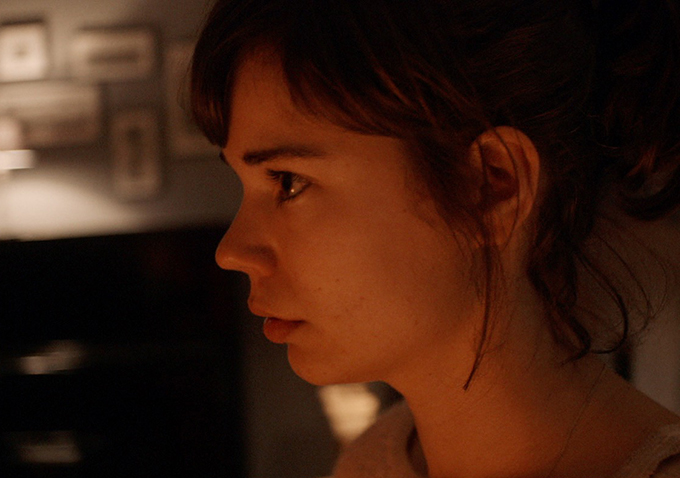 This is a reprint of our review from the 2015 Berlin International Film Festival.
This is a reprint of our review from the 2015 Berlin International Film Festival.
Like "Birdman," but for real! Like "Russian Ark," but fast! Like the six-minute unbroken raid sequence in "True Detective," only 23.3 times as long! You may have already heard about the "gimmick" of inevitable Berlinale Cinematography award-winner "Victoria," which traces in real time and without a single edit or any CG or camera trickery, a couple of action-packed, indelibly dramatic hours in the life of its unassuming, eponymous heroine. A little like the old adage that points out that while never as well-paid or as respected, Ginger Rogers did everything Fred Astaire did only backwards and in heels, here, the virtuosity of the direction and performances, which have to stay in the moment, hitting their marks throughout the entire runtime (oh, imagine fucking up in the final minutes?), is second only to that of the cinematographer, who had to be everywhere they are, all while lugging a camera and trying to keep the right bits in frame and in focus. It’s no wonder this is, I think, the only film I’ve ever seen to have the first credit that appears at the end be for DP Sturla Brandth Grovlen, with director Sebastian Schipper relegated to second place.
Astutely evoking the kind of tenuous relationships that can spring up during one drunken night in Berlin, "Victoria" opens in the small hours of the morning in a very Berlin nightclub, all strobe lights and thrumming techno, which, with its garage beats coming into and out of phase, sonically foreshadows the helter-skelter energy to come. Victoria (Laia Costa) is dancing blissfully, but soon we realize two things—she is alone and she is foreign, speaking in accented English (a clever but realistic flourish that means Schipper gets to be true to the street-level melting pot that is late-night Berlin, while also maximizing his film’s potential for foreign distribution). Rebuffed by the barman, she leaves the club, only to strike up a casual, jokey, mildly flirtatious conversation with a young local, Sonne (Frederick Lau), who is out celebrating a friend’s birthday. Pulled into the orbit of this tight little crew of guys, Victoria, a recent and somewhat lonely arrival from Madrid, is happy to tag along, prior to catching a couple hours of sleep in the cafe she’s due to open in a little while.

This first section is so charming and well-observed, and creates such real chemistry between the two terrific leads, that it’s almost a shame that it’s there to invest us in them just so the fast-paced genre flick to come has an anchor. I’d have happily sat through 2 hours 20 minutes of Costa and Lau negotiating the pitfalls of the early stages of mutual attraction, but then I am a notoriously soppy fool. Instead, however, a phone call to Sonne’s volatile ex-con friend, Boxer (Franz Rogowski), kicks off the story’s real thrust, rips Victoria out of this low-key indie romance and plunges her into an action/thriller/heist/chase/lovers on the run film. In shifting from a character-drives-plot to a plot-drives-character mechanic, it also introduces inevitable contrivance into what has been a very believable film up till then. Everything, because of the conceit, has to happen within a few blocks of this area, and everything has to happen now, now, now!
When you choose to deny yourself the luxury of an occasional nip and tuck, your film becomes essentially a stage play on the move, with no chance of a do-over. Schipper, Olivia Neergaard-Holm and Eike Schulz‘s screenplay, which evolved after several bouts of improvisation from a twelve-page outline, mostly manages that trick, though it relies on the insistent camerawork and the committed performances to carry us over the bumps. But it is not air-headed either—there is some insight here into the lure of running with the pack, into the kind of ferocious loyalty that can exist between groups of young guys, and how the promise of membership to a tribe can be so seductive, especially to a lonely young person, that she might shelve her better judgement for a chance at belonging. In a lovely early scene in the unopened cafe, Victoria, a recently-ex-aspirant pianist, plays Liszt’s "Mephisto Waltz," and Sonne’s undiscerning, but genuine, amazement at her talent goes a long way toward explaining why she would go along with the increasingly deranged, dangerous and criminal activities of the gang: as unsafe as things become, Sonne and the gang offer her an acceptance and an admiration that her insecure artist’s psyche craves.

Such psychological insights, however, were pretty much blasted out of my mind by the head-rush of the final half-hour or so. Definitely the tensest I’ve been in a cinema for a long time, some subconscious part of my brain that is used to the way films are normally made started begging for the relief of a cut that never comes. Couple that with the film’s slight overlength, and the necessarily shaky hand-held pictures that at times induce a certain motion sickness, and you’ve some small idea of the deliberately uncomfortable viewing experience it can be, but also of the visceral, often exhilarating, dynamic effect of its form. Schipper, Grovlen and the cast shot the film three times over, and the last take is the one we see here in its entirety and my amazement now is not that they can have achieved something so polished in just three tries. It’s that they can have lived that ridiculous night three whole times—from a stationary, seated position, I watched it just once and I am exhausted. [B+]

